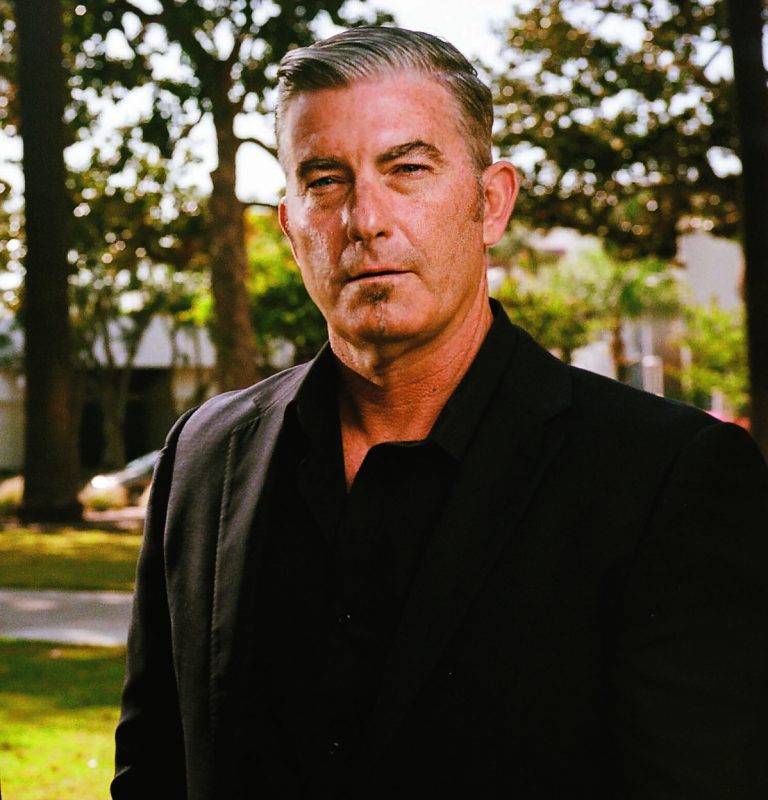OC Mass Murder Case Victim Helped Todd Spitzer Become DA, Now Feels Betrayed!
During Orange County’s infamous jailhouse-informant scandal, Todd Spitzer—a county supervisor eyeing the top prosecutor job—occasionally visited the courthouse when District Attorney Tony Rackauckas held press conferences. A natty, decades-younger Spitzer would stand behind the gaggle of print, radio and television reporters and watch an aging Rackauckas mumble semi-coherent answers or outright lies to questions. The supervisor’s presence unnerved the DA, who couldn’t compete with him rhetorically. Instead, he shot dead-eye expressions at his lurking, fellow Republican nemesis.
At one of these events in 2015, Bethany Webb, who’d lost her sister Laura in Orange County’s worse mass shooting, displayed disgust that Rackauckas defended once-secret law-enforcement corruption in hopes of securing the death penalty for the shooter. Those tainted government actions, which we’ve previously outlined, stalled the case for years and only prolonged trauma for Webb and other victims who wanted their criminal-justice-system nightmare over. But she was also not happy with Spitzer’s appearance.
“What is he doing here?” Webb asked Paul Wilson in what sounded more like a statement than a question. Wilson, who’d lost his wife Christy in the same 2011 mass killing, smiled awkwardly and shrugged his shoulders. At the time, he and Spitzer, who had spent years promoting himself as one of California’s leading victims’-rights advocates, were in the midst of forming a bond. He believed Spitzer sincerely felt Rackauckas had botched the case, though others disagreed.
“Most of the families [of the victims] hated Todd,” Wilson recently recalled. “They thought he was only around for the politics and said he was a bozo. I genuinely liked the guy. I thought if I helped put him in place at the DA’s office, he would right the wrongs.”
But the relationship has unraveled in anger for Wilson and frustration for Spitzer. There’s no mystery about the timing: It was in the wake of Spitzer’s impressive underdog November victory over Rackauckas, who’d been in office for two decades. Or the cause of their friction: Lingering issues from the government’s informant cheating as well as Wilson’s view he was used, then backstabbed by the incoming DA.
“He just became a different guy after he won,” said Wilson.
The rift underscores how swiftly relationships change in politics. Until the election, Wilson was a significant face and voice of Spitzer’s campaign. The two often chatted on the phone and attended events together. The challenger even convinced Wilson to use his weighty status in the victims’-rights community to do an anti-Rackauckas television commercial months before the election. Then, on the eve of the contest, Spitzer asked him to record a mass-produced robo-call ad.
“My name is Paul Wilson, and my wife and seven others were murdered in cold blood at the Seal Beach salon massacre here in Orange County,” Wilson read from a script written by the campaign. “The current DA, Tony Rackauckas, told me to my face that he would have my back during the trial. Instead, he cheated on the case and got caught. The judge kicked him off the case. Rackauckas betrayed us, and he is a complete failure in every regard. Crime is off the charts. We are not safe. We must elect Todd Spitzer as our new and vibrant DA. Todd Spitzer is a tireless victims’-rights advocate and has handled thousands of criminal cases as a veteran prosecutor. . . . Join me in fighting to restore justice in Orange County. I’m urging you to vote for Todd Spitzer on Nov. 6.”
At an election-night rally, Spitzer invited Wilson onto the stage. “He’s been through so much,” Wilson remembered Spitzer saying.

Within weeks of the election, however, Spitzer made a series of moves that alarmed his buddy. He kept longtime Rackauckas loyalist Ebrahim Baytieh—an accomplished homicide prosecutor but a Machiavellian bureaucrat who helped run taxpayer-funded publicity downplaying informant-scandal cheating—in a top management position.
“I know the protection that guy gave Tony,” Wilson explained. “Baytieh stood side by side with him. He delivered a more articulate version of Susan Kang Schroeder’s usual nonsense media spin. Keeping him in the new administration was a bad choice.”
(Schroeder served as Rackauckas’ reality-adverse, hot-headed media flack.)
Tensions grew worse when word leaked that Spitzer was also protecting Dan Wagner, who’d worked as the lead prosecutor of Scott Dekraai, the killer in the salon massacre. For several years, Wilson believed every word out of Wagner’s mouth, especially that he cared about the victims’ families. But over time, he became convinced the prosecutor was remorseless about his role in the informant scandal. Wagner had even self-demoted as head of the homicide unit into a lower-ranking post with greater civil-service protections from firing if Rackauckas lost. Spitzer then surprised everybody by promoting Wagner to run DA operations at North Court in Fullerton.
“There’s a major guy in the snitch scandal, and he’s able to teach all of his bad habits to the young people in the office,” Wilson said. “Wagner lied to us. He caused me and the families pain and suffering. Him getting promoted by Todd was a slap in the face. Remember, he told me that Wagner and the other DAs involved in the scandal were guilty and that it wouldn’t have happened under his watch.”
A chronic court watcher nowadays as he works to expose dirty law-enforcement officials, Wilson believes Spitzer is continuing Rackauckas’ efforts to block public accountability for the snitch controversy. On numerous occasions since the new DA’s swearing-in ceremony, Wilson has witnessed deputy DAs pretend the scandal (which wrecked at least 20 felony cases) didn’t happen. He’s also watched them work to keep embarrassing records secret from defense lawyers such as Scott Sanders, the assistant public defender who revealed the systemic snitch-related cheating after intensive investigations.
Unwilling to ignore what he sees as flip-flops, Wilson confronted Spitzer in text messages and phone calls. Emotional sentiments flew back and forth. He says the DA dismissed Rackauckas’ snitch-scandal woes, and thus him, as a reason for his victory. “It got pretty bad,” Wilson said. “I’m just blown away that he could so quickly turn on me. He told me that I needed to be more trusting of him now that he’s in the politics game.”
Those conversations heightened distrust. “There are more important things than politics, like making sure we have an honest criminal-justice system,” Wilson said.
For his part, the DA feels saddened by the feud, believes he is truly an agent for reform, and says he’s blocked from fully airing his side.
“I’ve spoken to Paul directly, but I’m not in a position to talk about anything at this time while I’m in the middle of the Department of Justice [DOJ] inquiry [into informant-scandal cheating],” Spitzer said. “So, you’re just going to have to print whatever you have to print with a clear understanding that while this is pending, I’m not able to say anything.”
In February, Spitzer—a former state assemblyman, school-board member and reserve Los Angeles cop—was willing to talk extensively with the Orange County Register where he complained about the DOJ probe. He said it was too time-consuming for his rookie administration, wanted federal officials to stop demanding access to records, and called on them to quickly issue findings before moving on elsewhere. That announcement caused Wilson to chuckle.
“He just doesn’t want to give up any more documents because it’s going to hurt,” he said. “The funny thing is I still think Todd is better than Rackauckas. But I’m not fooling myself. It’s business as usual inside that DA’s office. There’s no real sign of change. I thought this guy was a friend, and now I feel manipulated.”
On March 25, fate put Spitzer, his armed security entourage and Wilson in the same cramped Santa Ana courthouse elevator. The DA shook Wilson’s hand, hugged him and tried small talk. But this victim—a life-long law-enforcement champion before seeing criminal-justice-system warts up close—wasn’t in the mood for pleasantries. And he still has the same question: How can Spitzer employ prosecutorial scoundrels while declaring his agency cleansed?
CNN-featured investigative reporter R. Scott Moxley has won Journalist of the Year honors at the Los Angeles Press Club; been named Distinguished Journalist of the Year by the LA Society of Professional Journalists; obtained one of the last exclusive prison interviews with Charles Manson disciple Susan Atkins; won inclusion in Jeffrey Toobin’s The Best American Crime Reporting for his coverage of a white supremacist’s senseless murder of a beloved Vietnamese refugee; launched multi-year probes that resulted in the FBI arrests and convictions of the top three ranking members of the Orange County Sheriff’s Department; and gained praise from New York Times Magazine writers for his “herculean job” exposing entrenched Southern California law enforcement corruption.
cited from https://www.ocweekly.com/todd-spitzer-paul-wilson-murder/

